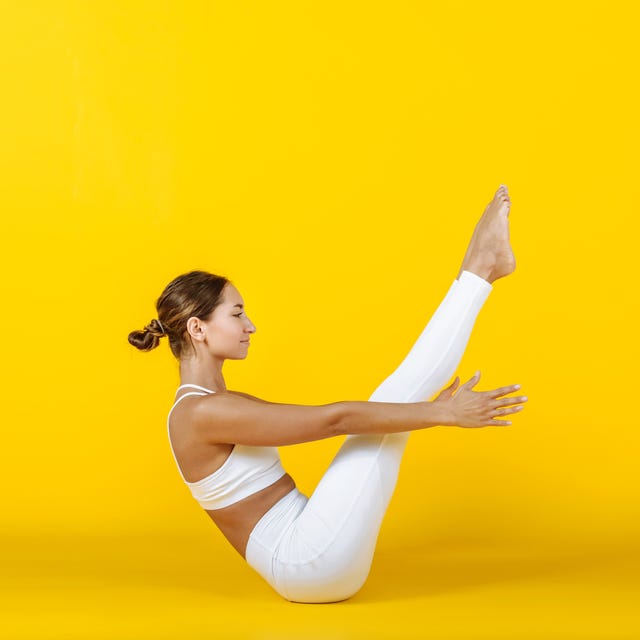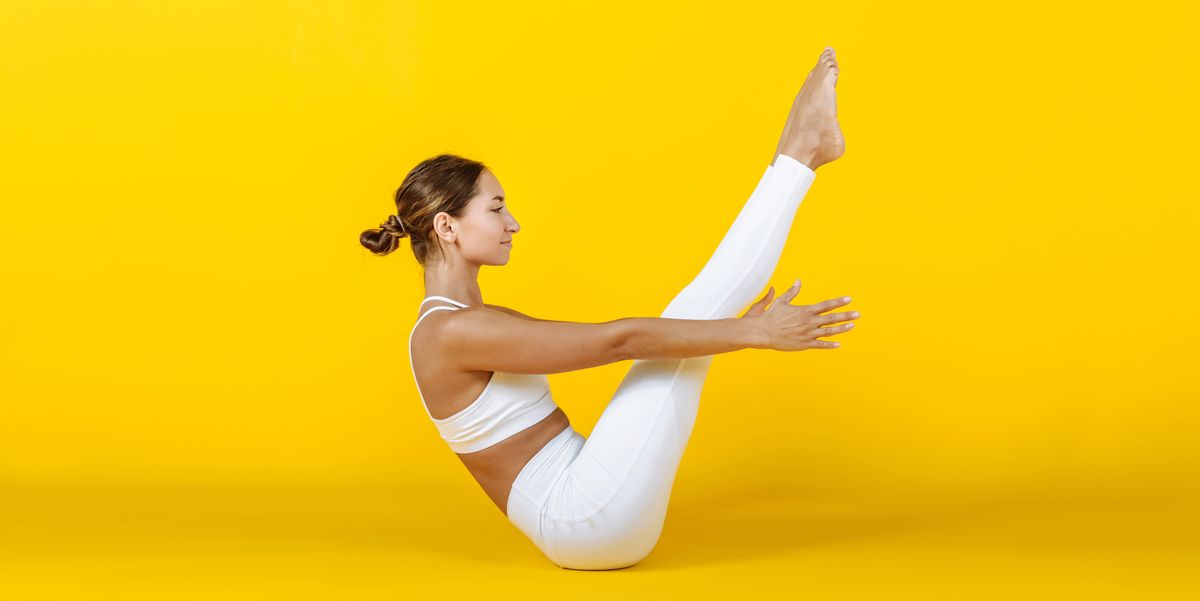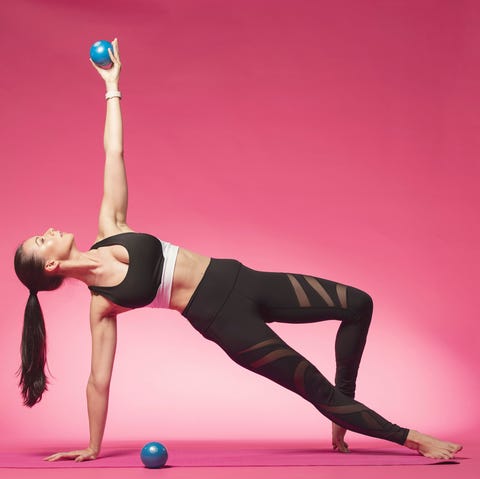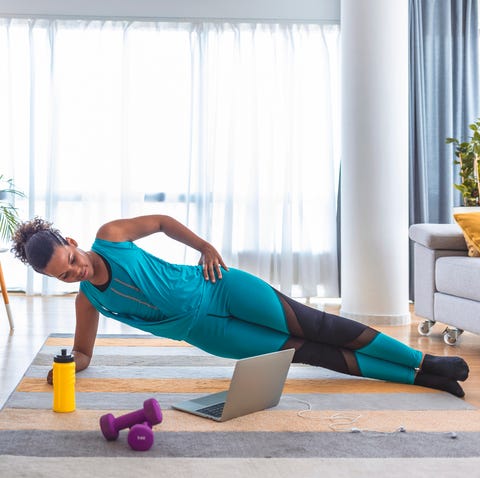
Alexandr DubyninGetty Images
An effective and low-impact workout, Pilates has been around for nearly 100 years, but has grown in popularity in recent decades. The unique strength training exercises work deep muscles and can improve everything from flexibility and balance to circulation and muscle control. Whether you’re just starting an exercise regimen or returning to workouts after an injury, Pilates is great for all levels of fitness, but is an especially good routine for beginners. Here’s everything you need to know about Pilates for beginners, including what equipment you need to get started and a complete workout plan, designed by fitness experts.
What Is Pilates?
“Pilates is a mind-body exercise that challenges your core and sculpts lean muscle,” says fitness instructor Cassey Ho, founder of Blogilates and author of protein-based cookbook Sculpt. Developed by Joseph Pilates, the exercise combines core stabilization, strength, flexibility, balance and proper alignment with concepts like mindfulness, breathing techniques and fluidity of movement.
The workout was initially designed to help injured athletes and dancers return to exercise in a safe manner and also maintain fitness moving forward. “All that pulsing paired with deep mind-muscle connection is what makes Pilates extremely effective,” Ho says.
Pilates Benefits
Ho says that one of the main benefits of Pilates stems from the fact that the workout strengthens your deepest muscles, which are much more difficult to target with other types of workouts. One of the biggest positive benefits is the intense core engagement, which Ho says hits the deepest parts of your abdominals. “A stronger core also helps with better posture which ends up making you look taller and more confident!” Here are just a few of the health benefits you can reap from practicing Pilates:
- Improved posture, coordination and balance
- Enhanced flexibility and stabilization
- Increased muscle strength and control
- Improved stress management and mind-body connection
- Enhanced circulation and lung capacity due to deep breathing
- Balanced strength on both sides of the body
- Pilates stance: This movement involves heels together and toes apart.
- Midline: An imaginary line from your head to your toes that your instructor will cue you to “hug” to help with balance and engage your core.
- Tabletop: You begin a few core exercises in tabletop, laying on your back with your legs up in a 90° angle.
- Tuck: This just means a slight round in the low back to encourage good alignment and core engagement. Booty in, core engaged.
- Lay on your back, bend your knees and lift your feet off the ground, stacking your knees over your hips and keeping your shins parallel to the floor.
- Lift your head and shoulders off of the ground making sure to lift using abdominal muscles by pushing your ribs up and shifting them toward your hips to keep pressure off your head and neck and to keep abs engaged.
- Extend arms by your sides and pump them up and down, inhaling on a count of four and exhaling for a count of four.
- Lay on your back, bend your knees and lift your feet off the ground, stacking your knees over your hips and keeping shins parallel to the floor.
- Lift your head and shoulders off of the ground, making sure to lift using your abdominal muscles, pushing your ribs up and shifting them toward your hips to keep pressure off your head and neck, keeping abs engaged.
- Extend one leg and pull your opposite leg into your chest, then switch, alternating.
- Lay on your back with legs extended, inhale as you lift one vertebrae at a time, rolling your body up to a seated position.
- Then with control, exhale as you lower back down one vertebrae at a time. To modify this move to be less intense, bend your knees and grab the back of your legs for support as you roll up.
- Lay on your back, bend your knees and lift your feet off the ground, stacking your knees over your hips, keeping shins parallel to the floor.
- Drop one foot to the floor, lightly tapping your toes, then alternate with the other leg.
- Lying on your back, extend both legs into the air and exhale as you drop both legs towards the floor (but make sure to stop when your legs are in line with your hips). To modify, bend your legs.
- Start on all fours with knees directly under your hips and hands directly under your shoulders (to increase intensity shift forward slightly).
- Lift knees off the floor, keeping your hips in line with your shoulders and not lifting up too high.
- Brace your belly and breathe.
Pilates Tips for Beginners
“Pilates is perfect for beginners, or even someone coming back into fitness after some time off,” Ho says. “Literally every move has a modification, so you can take what you need and then level up as you grow stronger.” She adds that since Pilates is a low-impact form of exercise, it’s also easy on the joints.
Mat Pilates is also a great entry into fitness for beginners since it doesn’t require anything else besides a yoga mat, which means it’s easy to get started. “All you need to start is some space to move,” says Ho. “If you don’t have a mat, just find a soft and sturdy surface to lay on, like carpet. When you’re ready, you can add intensity with resistance bands, light weights, blocks or a Pilates ring.”
When it comes to specific Pilates terms and lingo, Ho says that as you practice you’ll quickly learn the names of the moves you love. Some common terms that you may hear frequently used in a Pilates workout include:
10-Minute At-Home Pilates Workout for Beginners
This short but effective workout is a great entry into Pilates and targets the abdominals. You can try this 10-minute Pilates workout at home right now — no special equipment required. Follow along with the video and read on for Ho’s specific instructions on how to properly perform each exercise.
This content is imported from YouTube. You may be able to find the same content in another format, or you may be able to find more information, at their web site.
1. The 100s
2. Single Leg Stretch
3. Roll-Ups
4. Single Leg Drop
5. Double Leg Lift
6. Plank
How to Continue Your Pilates Journey
In addition to in-person workouts at your local Pilates studio, there are a variety of on-demand and live Pilates classes available through workout apps and Youtube workout channels.
Our sister brand Prevention even offers a 10-Minute Pilates workout DVD ($27.95) that includes six Pilates workouts that focus on breathing, stretching and lengthening your muscles, plus a bonus guide that includes a daily workout schedule. If you’re looking for a complete pilates workout program for beginners, Ho offers a 28-day Beginner’s Workout Calendar program through her Body by Blogilates app ($3.99/month for a premium subscription) that is designed to help anyone just starting out or getting back into exercise.
The Bottom Line
Regardless of whether you commit to a full program or just start to incorporate Pilates into your exercise regimen once or twice a week, Pilates is an incredible total body workout doesn’t take much equipment or experience to start.
This content is created and maintained by a third party, and imported onto this page to help users provide their email addresses. You may be able to find more information about this and similar content at piano.io



